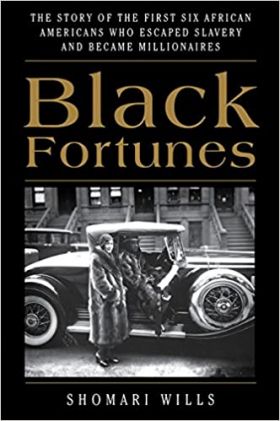Black Fortunes
Black Fortunes: The Story of the First Six African Americans Who Survived Slavery and Became Millionaires is a nonfiction book by Shomari Wills. It was published on January 30, 2018 by the Amistad Press with 320 pages.[1]
"Black Fortune" tells the extraordinary story of Mary Ellen Pleasant, Robert Reed Church, OW Gurley, Hannah Elias, Annie Turbo Malone and Madam CJ Walker, they are the first cohort of black millionaires in the United States, their journey to freedom and wealth and their contribution to end slavery.[2]
Summary
Wills is a former contributor to Good Morning America. He tells the incredible stories of six self-made African American millionaires who lived in the decades after Lincoln's emancipation proclamation.
Hannah Elias (1865–1903) was given land by her millionaire lover and used the money to help African Americans move to Harlem.
A school teacher O.W. Gurley (1868–1921) developed his land in Oklahoma into an all-black trading district known as Black Wall Street.
Robert Reed Church (1839–1912) purchased property in Memphis, which he converted into the black music precinct that became the famous Beale Street of Memphis.
Mary Ellen Pleasant (1814–1904) profited from the Gold Rush and used her fortune to fund abolitionist causes, including the attack on Harpers Ferry by John Brown.
Annie Minerva Turnbo (1877–1957), a self-taught chemist from Peoria, Illinois, built the first black hair care empire, only to be defeated by her former student, Madam C.J. Walker (1867–1919).
This highly readable group biography describes how the early millionaires "survived attempted murder, death sentences, reckless lawsuits, and criminal cases" and, in doing so, paved the way for Oprah, Beyonce, and Jay-Z.[3]
Reception
Positive Reviews
This book remind us that African-Americans do not lack the desire or ability to work or build businesses and wealth, but they often have to overcome huge obstacles to achieve economic stability, not to mention independence and power.
Early in its history, African-Americans who acquired wealth were often attacked, demonized or defrauded by people who knew the Jim Crow court system. The black elites survived assassinations, lynchings, and trivial lawsuits in the first few decades of their establishment, all of which were designed to destroy or devalue their wealth.[2]
The people in Black Fortunes are no different. Being African Americans put them at a disadvantage but it was their intelligence, drive, and determination that helped some to overcome their circumstances to become the pioneers we now know them to be.[4]
Negative Reviews
Although "Black Fortunes" is a great idea it really needs an editor. Terri Schlichenmeyer said in Inside Business, that the book has dates that didn't match, incorrect information, statements that conflicted with other statements, silly repetitions.[5]
Other sources, Maribel Morey said that this book is not an academic book. Black Fortunes avoided footnotes and chose the "source notes" at the end, in which the author discussed the main and auxiliary sources that supported his main argument.[6]
References
- ↑ BLACK FORTUNES: THE STORY OF THE FIRST SIX AFRICAN AMERICANS WHO ESCAPED SLAVERY AND BECAME MILLIONAIRES (PB). Mahogany Books. Retrieved January 24, 2021.
- ↑ 2.0 2.1 Nkosi, Oupa. Blackness has a history of assets. Mail & Guardian April 3, 2019. Retrieved January 24, 2021.
- ↑ Black Fortunes: The Story of the First Six African-Americans Who Escaped Slavery and Became Millionaires. Publisher Weekly. Retrieved January 24, 2021.
- ↑ Moreno, Chasity. Book Review: "Black Fortunes" by Shomari Wills. New York Public Library May 30, 2018. Retrieved January 24, 2021.
- ↑ Schlichenmeyer, Terri. Despite faults, "Black Fortunes" is worth a look | Book review. Inside Business March 16, 2018. Retrieved January 24, 2021.
- ↑ Morey, Maribel. A Review Of Shomari Wills’s BLACK FORTUNES (2018). HISTPHIL April 27, 2018. Retrieved January 24, 2021.
